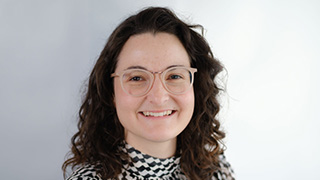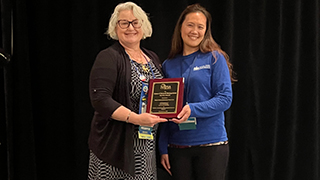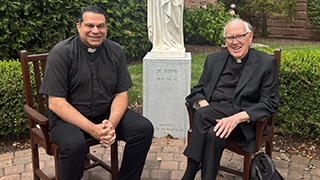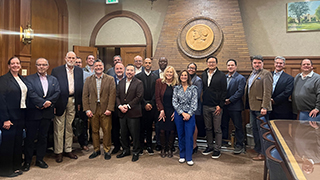Visiting Scholar Presents on Polarization in Religion
Monday, April 22, 2024
 Last month, Lina Rodenhausen, a doctoral candidate at the Center for Religious Studies
at Ruhr-Universität Bochum, conducted a presentation for faculty members from the
College of Human Development, Culture, and Media concerning her current research for dissertation. The presentation, "Exploring the
Nexus of Polarization, Religion, and Social Media," focused on her investigation into
two divergent Christian communities on the social media platform Reddit. During the
presentation, Rodenhausen articulated her fascination with the subject, elaborated
on her preliminary findings, and engaged with inquiries from the audience, seeking
diverse viewpoints on her ongoing research.
Last month, Lina Rodenhausen, a doctoral candidate at the Center for Religious Studies
at Ruhr-Universität Bochum, conducted a presentation for faculty members from the
College of Human Development, Culture, and Media concerning her current research for dissertation. The presentation, "Exploring the
Nexus of Polarization, Religion, and Social Media," focused on her investigation into
two divergent Christian communities on the social media platform Reddit. During the
presentation, Rodenhausen articulated her fascination with the subject, elaborated
on her preliminary findings, and engaged with inquiries from the audience, seeking
diverse viewpoints on her ongoing research.
Rodenhausen’s motivation for visiting Seton Hall University is twofold. First, during last summer, Ruth Tsuria, Ph.D., associate professor of communication and director of graduate studies, encountered Rodenhausen at the International Society for Media, Religion, and Culture conference hosted by Ruhr-Universität Bochum. Familiar with Rodenhausen's academic advisor, Tsuria and Rodenhausen engaged in discussions about their respective research, finding each other’s work interesting. Consequently, Rodenhausen contacted Tsuria in the fall, requesting a visit, a request to which she gladly obliged.
Furthermore, amidst her dissertation work, Rodenhausen sought to validate her research and methodology by acquiring diverse perspectives and suggestions to enhance her research. Presenting to fellow communication scholars offered her the chance to connect with like-minded individuals who share similar research interests. Doing so helps her improve her research methods and her perspective on the data.
Discussing her research, Rodenhausen noted that she chose to study "the community r/OpenChristian, which was created for those with an interest in progressive Christianity, and another the community r/TrueChristian, in which mostly Christians with conservative attitudes gather." Through analyzing these forums, Rodenhausen aimed to comprehend the polarization fueling both groups' interactions online and offline. She identified significant divisions within the communities, particularly concerning the interpretation of scripture and the portrayal of God's gender, whether as male or female. These thematic differences underscore the profound ideological chasm between the two groups.
In addition, by directing her attention to the subreddits, Rodenhausen aimed to grasp the impact of social media on polarization which pushed her to ask questions about social media and how it affects polarization. Does social media foster an echo chamber within these communities, leading to an us-versus-them mentality? Does it exacerbate polarization, culminating in the inevitable outcome of all political and religious discussions? To the common ear, political polarization is a haunting prospect. Although no less true for Rodenhausen, she believes that there can be something intellectually gained from studying it.
Discussing her approach to researching this polarization, Rodenhausen discussed the following process:
One approach that helps me understand the communities and the polarization between them is the analysis of metaphors. This dissertation is part of a collaborative research center on metaphors of religion. In various subprojects that focus on different religious traditions, geographical areas, and historical times, we work together under the assumption that metaphors contribute crucially to religious meaning-making. In my analyses, I can observe how the metaphors these Christians use, transport their religious beliefs and theological positions so that I can work out their differences.
To help uncover these metaphorical differences, Rodenhausen developed a computational method, using practices common in the field of digital humanities. By developing an algorithm, processing the data becomes easier and improves the critical analysis of the research.
While Rodenhausen is nearing the completion of her project, the dissertation journey still presents formidable challenges. She stated, "The difficulty in writing a dissertation is limiting yourself to the aspects you can research and answer but still presenting enough to make a considerable contribution to your field." The challenge is daunting, but if the reactions from the faculty during the presentation are any indication, she is definitely up for the task.
About the Institute for Communication and Religion
Launched in Fall 2017, the Institute for Communication and Religion within the College of Human Development, Culture, and Media provides a nexus for ongoing scholarly exploration of communication topics critically important to religion and society. Guided by the spirit of ecumenical and interreligious cooperation, the Institute seeks to engage in public dialogue and debate, promote academic inquiry and support the religious dimension of creativity — all while upholding the values of servant leadership, curricular innovation and intellectual excellence.
Categories: Faith and Service, Research






